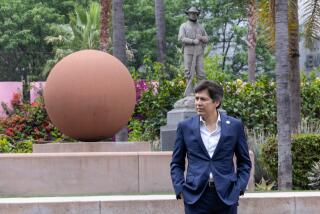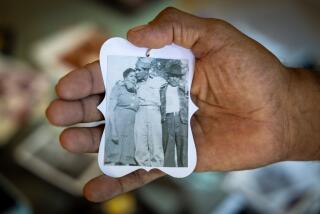Way Out West, South’s Legacy Is Kept Alive
The ex-Confederate soldier was old--a bachelor, a retired gold miner. He had fought for the 7th Tennessee Cavalry and headed west in 1875. California was home, and in his last years, Pvt. Charles Fox had one place to go.
The story of how Confederate heritage groups got started in Southern California begins with Civil War veterans like Fox, who settled at Dixie Manor in San Gabriel, the only home for retired rebel soldiers outside of the former Confederate states. The United Daughters of the Confederacy’s local chapter ran the place, from 1929 to 1936, in a large, pale pink, bungalow-style house that felt like home; the women made sure of that.
Fox stayed there until he died, along with 27 other veterans, including a doctor and a cattle merchant. About half eventually were buried in a Confederate section at Hollywood Forever Cemetery (formerly Hollywood Memorial Park Cemetery). Today, the Daughters, along with the local Sons of Confederate Veterans, still leave flowers and Confederate battle flags on their graves.
“Confederate heritage is about honoring the service of our ancestors who stood up for what they believed in--basically states’ rights,” says Connie Moretti, California division president of the Daughters group.
Membership in local Confederate heritage groups remains steady, even as the Civil War grows more distant. Statewide, the Daughters and Sons groups each have about 300 members and a long list of projects. (Anyone who is related by blood to a Confederate soldier is eligible.)
What’s known as a Real Daughter or a Real Son--someone whose father fought for the Confederacy--is the most honored and shrinking rank. The two groups claim 225 Real Sons and 325 Real Daughters nationwide; they are the standard bearers, the comforting links to a maligned past, members say. Coincidentally, a son and a daughter of a Confederate veteran live 10 miles from each other in Santa Barbara County.
In California, a Union state, far from the lost Confederacy, the local chapters of the Daughters and Sons groups were founded to honor and care for ailing soldiers. (Groups for descendants of Union soldiers also exist nationwide, but are less visible.) As the veterans died, the groups’ mission changed to honor the ideals that the men fought for--a charge, its leaders know, that is not without controversy.
For the local Sons groups, the heritage includes flying the Confederate battle flag at their events. The red flag with a star-studded blue X is regarded by some as a symbol of slavery and racism, and by Confederate heritage groups as a banner of honor. (The local Daughters groups fly another Confederate flag that is less known.)
To Others, This Legacy
Is Troubling History
In Los Angeles, the Confederate flag raises eyebrows, said Joe R. Hicks, executive director of the city’s Human Relations Commission. With all due respect, he said, the reaction might be that “these are odd ducks, trying to relive some strangely romantic notions of an ugly history. . . . Clearly for black Americans, that flag symbolizes a very dark and troubling past and an attempt . . . to preserve the treatment of human beings in a way that worldwide is acknowledged as being despicable.”
The groups say they try to stay away from the politics and push service.
Each year, for instance, the Daughters group awards up to $5,000 in scholarships to descendants of Confederate soldiers in California. It tracks elderly descendants of Confederate soldiers and sends them birthday cards. It donates books and magazines to local libraries that reflect a “Confederate point of view,” Moretti said.
In a project with the Sons, members are trying to identify the graves of Confederate veterans in California. In research for a book, Barron Smith, of the Santa Barbara chapter of the Sons, has identified 1,000 graves of ex-Confederate soldiers in California.
Last year, at Santa Maria Cemetery, one of those graves was honored for the first time, after Smith’s sleuthing paid off.
Smith had stumbled across the grave and then obituary of William Scott Lawrence, 1848-1934. The Mississippi native was a Confederate prison guard in Texas. Later, Smith made another find: Lawrence’s daughter still lived nearby.
Until Smith called, though, Lawrence’s 91-year-old daughter had never heard of the Sons or Daughters groups. Dorothy Phelps’ father was 59 when she was born and never talked about the war.
“To me, it was just history,” the retired schoolteacher said.
But when Smith asked if the Sons group could recognize her father’s grave, she said sure. The ceremony was lovely, with a 21-gun salute, and Phelps was happy that her father was honored.
Father’s War Stories
Were Just a Memory
Near Santa Maria, on Union Street, 81-year-old Woodrow Wilson Plaugher’s life wasn’t entwined with the Civil War either.
Plaugher, a widower, was a retired appliance repair worker and plant foreman. He had packed away his father’s war stories with his childhood, until a local newspaper reporter asked a few questions.
Yes, his dad, who was 75 when he was born, had served as a scout for Gen. Robert E. Lee’s troops in Gettysburg. Yes, his dad, Pvt. Jacob Plauger (the spelling later changed), fought with the 7th Virginia Cavalry at the second Battle of Bull Run in August 1862. Yes, his dad died in 1936 when he was 17 but not before telling him how smart Gen. Lee was.
In October 1995, the Santa Maria Times ran his story, and the Civil War juggernaut caught up with him. Plaugher found out about the Sons group and joined. In 1996, he rode in a parade in Richmond, Va., in a ’28 Nash with a sign saying he was a Real Son. Earlier this year, he set up an old typewriter and started to hunt and peck for the keys to his father’s life story.
His dad’s feet had frozen in the war, and his toenails had turned black. On the family’s 20-acre farm in Ohio, the father would soak his feet in saltwater and tell stories. His dad didn’t believe in slavery, although his family owned several slaves. He was a farm boy, fighting for his South. Duty called but had no answers. During the war, he had several horses shot from under him. At night, he would lie awake and think, When is this thing going to quit?
Even now, Plaugher is unsure what the war was about. But he is sure about his father’s legacy.
His father put his life on the line for the Confederacy, and when that collapsed, he still honored his country. He made sure his children did the same. When they saw the American flag, he would say, get your hat off and salute.
Now, at Sons ceremonies, Plaugher puts on a Confederate uniform replica and salutes too. It’s a connection to his father and his heritage that the Sons group helped forge.
“It makes you feel like you’re part of it,” he said. “It makes me feel I’m one of them, and I’m showing the South respect.”
Renee Tawa can be reached by e-mail at Renee.Tawa@latimes.com.
More to Read
Sign up for Essential California
The most important California stories and recommendations in your inbox every morning.
You may occasionally receive promotional content from the Los Angeles Times.










